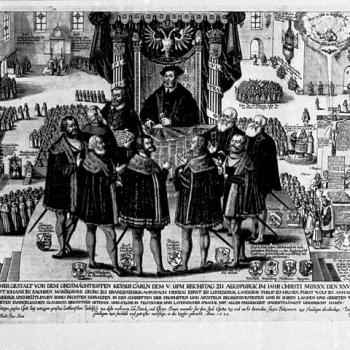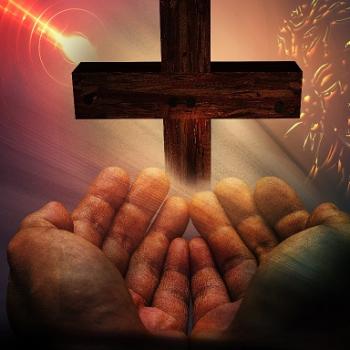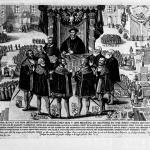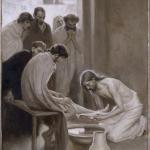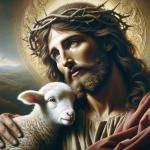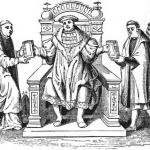
This is an installment of a series of replies (see the Introduction and Master List) to much of Book IV (Of the Holy Catholic Church) — and some portions of Books I-III — of Institutes of the Christian Religion, by early Protestant leader John Calvin (1509-1564). I utilize the public domain translation of Henry Beveridge, dated 1846, from the 1559 edition in Latin; available online. Calvin’s words will be in blue. All biblical citations (in my portions) will be from RSV unless otherwise noted.
Related reading from yours truly:
Biblical Catholic Answers for John Calvin (2010 book: 388 pages)
A Biblical Critique of Calvinism (2012 book: 178 pages)
Biblical Catholic Salvation: “Faith Working Through Love” (2010 book: 187 pages; includes biblical critiques of all five points of “TULIP”)
*****
III, 22:1-3
***
1. Many controvert all the positions which we have laid down, especially the gratuitous election of believers, which however cannot be overthrown.
I don’t know who Calvin thinks he is contending against on this score. It’s not Catholics. We (along with virtually all other non-Calvinist Christians) believe in the predestination of the elect:
Catholic Teaching: Predestination of the Elect (Ludwig Ott) [1996]
Predestination & the Ingenious “Solution” of Fr. Most [4-22-06]
Do Catholics Believe in Predestination? Yes! But . . . [8-29-06]
For they commonly imagine that God distinguishes between men according to the merits which he foresees that each individual is to have, giving the adoption of sons to those whom he foreknows will not be unworthy of his grace, and dooming those to destruction whose dispositions he perceives will be prone to mischief and wickedness. Thus by interposing foreknowledge as a veil, they not only obscure election, but pretend to give it a different origin. Nor is this the commonly received opinion of the vulgar merely, for it has in all ages had great supporters (see sec. 8).
Now he switches from the fact / belief in the predestination of the elect / eschatologically saved, to how God decides such predestination. And that is a very different issue. Since all agree that this is one of the most mysterious aspects of Christianity, one should expect different theories on the inner workings of it (essentially trying to decipher an omniscient God’s mind and will). And these should be allowed.
I have defended a Molinist (non-Calvinist and non-Thomist) understanding of predestination:
Dialogue on God’s Middle Knowledge & Foreknowledge (vs. Dr. Alexander Pruss) [1997]
Dialogue on Molinism and on How God Predestines (+ Part II) [4-15-06 and 4-24-06]
Dialogue: Molinism & How God Predestines (Pt. III) (+ Pt. IV) [5-2-06 and 5-14-06]
Catholic Predestination, Molinism, & Thomism in a Nutshell [3-27-08]
This broad view does not “obscure” election at all. It’s simply a way to try to theorize and understand God’s choices, within an understanding that He is as loving and merciful as He is just. Calvin ought to be tolerant of different opinions regarding this mystery of the faith. He doesn’t know everything. And on this issue, no one does.
This I candidly confess, lest any one should expect greatly to prejudice our cause by opposing it with their names. The truth of God is here too certain to be shaken, too clear to be overborne by human authority.
To the contrary, we don’t know enough about how God predestined to be dogmatic about it.
Others, who are neither versed in Scripture, nor entitled to any weight, assail sound doctrine with a petulance and improbity which it is impossible to tolerate. Because God of his mere good pleasure electing some passes by others, they raise a plea against him.
It’s not against God; it’s against notions of God that would turn Him into a merciless tyrant and unjust judge. We know that He is not those things, from many other clear scriptural passages.
But if the fact is certain, what can they gain by quarrelling with God?
Nothing; but it’s not what we’re doing. We’re quarelling with Calvin’s demotion of God to a mere petty, arbitrary tyrant.
We teach nothing but what experience proves to be true—viz. that God has always been at liberty to bestow his grace on whom he would.
That’s right. And He does it in a loving, fair, just fashion. Calvin’s system is contrary to that.
Not to ask in what respect the posterity of Abraham excelled others, if it be not in a worth, the cause of which has no existence out of God, let them tell why men are better than oxen or asses.
Because God made us in His image in a way that He did not in the case of the animals.
God might have made them dogs when he formed them in his own image.
Sure; but He didn’t, so why is this line of thought relevant?
Will they allow the lower animals to expostulate with God, as if the inferiority of their condition were unjust?
Again, we’re not arguing with God, but with Calvin (the two being quite distinct).
It is certainly not more equitable that men should enjoy the privilege which they have not acquired by any merit, than that he should variously distribute favours as seems to him meet.
What we in fact know from Holy Scripture is that meritorious works have a great deal indeed to do with who is saved in the end. I found fifty passages that teach this very thing:
Final Judgment & Works (Not Faith): 50 Passages [2-10-08]
If they pass to the case of individuals where inequality is more offensive to them, they ought at least, in regard to the example of our Saviour, to be restrained by feelings of awe from talking so confidently of this sublime mystery.
Projection if there ever was such a thing . . .
He is conceived a mortal man of the seed of David; what, I would ask them, are the virtues by which he deserved to become in the very womb, the head of angels, the only begotten Son of God, the image and glory of the Father, the light, righteousness, and salvation of the world? It is wisely observed by Augustine, that in the very head of the Church we have a bright mirror of free election, lest it should give any trouble to us the members—viz. that he did not become the Son of God by living righteously, but was freely presented with this great honour, that he might afterwards make others partakers of his gifts. Should any one here ask, why others are not what he was, or why we are all at so great a distance from him, why we are all corrupt while he is purity, he would not only betray his madness, but his effrontery also. But if they are bent on depriving God of the free right of electing and reprobating, let them at the same time take away what has been given to Christ.
I don’t have the slightest idea what he is trying to argue here . . . whatever it is, it has little to do with the topic.
It will now be proper to attend to what Scripture declares concerning each. When Paul declares that we were chosen in Christ before the foundation of the world (Eph. i. 4), he certainly shows that no regard is had to our own worth;
Well, this text doesn’t indicate why the elect were chosen; simply that they were chosen.
for it is just as if he had said, Since in the whole seed of Adam our heavenly Father found nothing worthy of his election, he turned his eye upon his own Anointed, that he might select as members of his body those whom he was to assume into the fellowship of life. Let believers, then, give full effect to this reason—viz. that we were in Christ adopted unto the heavenly inheritance, because in ourselves we were incapable of such excellence.
No one is denying that. Catholics believe in salvation by grace alone just as Calvinists do:
Grace Alone: Perfectly Acceptable Catholic Teaching [2-3-09]
Grace Alone: Biblical & Catholic Teaching [12-1-15]
But we refuse to deny that it is without our free will cooperation and minus any consideration whatever of our good works (enabled by grace) and merit obtained thereof (which St. Augustine said was “God crowning His own gifts”).
This he elsewhere observes in another passage, in which he exhorts the Colossians to give thanks that they had been made meet to be partakers of the inheritance of the saints (Col. i. 12).
Of course we give thanks. No one disagrees with that.
If election precedes that divine grace by which we are made fit to obtain immortal life, what can God find in us to induce him to elect us?
Only our free will cooperation with His enabling, preceding will that gave us the power to cooperate. He’s crowning His own gifts.
What I mean is still more clearly explained in another passage: God, says he, “hath chosen us in him before the foundation of the world, that we might be holy and without blame before him in love: having predestinated us unto the adoption of children by Jesus Christ to himself, according to the good pleasure of his will” (Eph. i. 4, 5). Here he opposes the good pleasure of God to our merits of every description.
Calvin assumes what isn’t in the text. This text and others like it don’t rule out merit and cooperation with good works. Again, it says that He chose the elect; not how or why, or with what criteria. That’s mostly why it’s such a great mystery, because revelation simply doesn’t tell us those things, and we have to speculate based on what we do know of God’s nature and His benevolence and mercy towards all, and in light of several passages indicating that He desires the salvation of all (not universalism, but universal atonement; availability to all who accept His free grace of salvation). See:
Bible vs. Double Predestination (No Reprobate Parallels) [4-22-10]
2. That the proof may be more complete, it is of importance to attend to the separate clauses of that passage. When they are connected together they leave no doubt. From giving them the name of elect, it is clear that he is addressing believers, as indeed he shortly after declares. It is, therefore, a complete perversion of the name to confine it to the age in which the gospel was published. By saying they were elected before the foundation of the world, he takes away all reference to worth.
The latter topic was never mentioned in the passage. But “worth” and merit certainly are prominently mentioned as a major criteria of salvation in at least 50 passage I have found. Notice how Calvin brings in no more Scripture in this section. Imagine him trying to refute all fifty of my proofs. That would be a sight to see! But as it is, he’s just spouting off the top of his head, with little biblical grounding.
For what ground of distinction was there between persons who as yet existed not, and persons who were afterwards like them to exist in Adam?
The distinction lies in how each human being responds to God’s sufficient grace:
Does Catholic Merit = “Works Salvation”? [2007]
Catholic Bible Verses on Sanctification and Merit [12-20-07]
Our Merit is Based on Our Response to God’s Grace [2009]
Bible: God Shares Glory with His Creatures [1-3-10]
But if they were elected in Christ, it follows not only that each was elected on some extrinsic ground, but that some were placed on a different footing from others, since we see that all are not members of Christ.
Yes, grace is distributed differentially, as I have written about. The question then becomes: “why?”. And that is the question where Calvin punts every time.
Degrees of Grace / Quantifiable Differences in Grace [5-4-17]
In the additional statement that they were elected that they might be holy, the apostle openly refutes the error of those who deduce election from prescience, since he declares that whatever virtue appears in men is the result of election.
Yes, of course. Catholics agree that absolutely every good thing we do must be preceded by God’s enabling grace.
Then, if a higher cause is asked, Paul answers that God so predestined, and predestined according to the good pleasure of his will. By these words, he overturns all the grounds of election which men imagine to exist in themselves.
Not at all. Again, this is only dealing with the ultimate reality: that God elects whoever is elect. It doesn’t touch upon the reasons.
For he shows that whatever favours God bestows in reference to the spiritual life flow from this one fountain, because God chose whom he would, and before they were born had the grace which he designed to bestow upon them set apart for their use.
Indeed. None of this proves that he predestined people to hell without their free will in freely rejecting God and His grace. That’s the awful and wicked conclusion that Calvin’s denial of free will and merit and works as part and parcel of faith inexorably leads to. It turns God (i.e., what is falsely imagined to be God) into a cruel tyrant and despot.
3. Wherever this good pleasure of God reigns, no good works are taken into account.
If they are taken into account as regards salvation on Judgment Day, chances are that they have already been taken into account in God’s decision of who will be among the elect. In other words, it’s highly implausible that works and merit play such an absolutely central role in the criteria of salvation, while at the same time supposedly playing none in God’s decision in choosing who to elect.
The Apostle, indeed, does not follow out the antithesis, but it is to be understood, as he himself explains it in another passage, “Who hath called us with a holy calling, not according to our works, but according to his own purpose and grace, which was given us in Christ Jesus before the world began” (1 Tim. ii. 9).
[It’s actually 2 Tim 1:9, that Calvin refers to] That’s simply the denial of works-salvation, or Pelagianism. We’re not saved by works themselves, yet they are necessary and central in terms of being a “working-out” of our grace-enabled faith. Molinists believe that God elected by His grace and sovereign will, but took into consideration how each person responded to His grace (which He knows in His foreknowledge and middle knowledge (of all worlds and all possibilities of what might have ben in different circumstances).
We have already shown that the additional words, “that we might be holy,” remove every doubt. If you say that he foresaw they would be holy, and therefore elected them, you invert the order of Paul. You may, therefore, safely infer, If he elected us that we might be holy, he did not elect us because he foresaw that we would be holy. The two things are evidently inconsistent
They’re not inconsistent at all. This is a classic example of Calvin’s illogical “either/or” reasoning that is contrary to the Bible. The Bible teaches that God does things in us, but that we freely cooperated at the same time:
Man’s Grace-Enabled Cooperation w God (1 Cor 3:9) [5-8-02]
Merit and Cooperating with God for Salvation [7-8-07]
Merit & Human Cooperation with God (vs. Calvin #35) [10-19-09]
Scripture on Being Co-Workers with God for Salvation [2013]
“Reply to Calvin” #3: Synergism, Grace Alone, & the Elect [4-3-17]
—viz. that the pious owe it to election that they are holy, and yet attain to election by means of works.
But we are not saying that they earn election by works; rather, that God took into consideration our response to His grace, in electing and predestining.
There is no force in the cavil to which they are ever recurring, that the Lord does not bestow election in recompense of preceding, but bestows it in consideration of future merits. For when it is said that believers were elected that they might be holy, it is at the same time intimated that the holiness which was to be in them has its origin in election.
Yes, of course it does. But it doesn’t follow that we don’t get credit or merit for cooperating with this free grace.
And how can it be consistently said, that things derived from election are the cause of election?
They’re not the ultimate cause. God’s grace and His decision are the cause.
The very thing which the Apostle had said, he seems afterwards to confirm by adding, “According to his good pleasure which he hath purposed in himself” (Eph. i. 9); for the expression that God “purposed in himself,” is the same as if it had been said, that in forming his decree he considered nothing external to himself; and, accordingly, it is immediately subjoined, that the whole object contemplated in our election is, that “we should be to the praise of his glory.”
In the same epistle, St. Paul states that, though we are not saved by works, God ordained that we should walk in them, as part and parcel of salvation:
Ephesians 2:8-10 For by grace you have been saved through faith; and this is not your own doing, it is the gift of God — [9] not because of works, lest any man should boast. [10] For we are his workmanship, created in Christ Jesus for good works, which God prepared beforehand, that we should walk in them.
God doesn’t think in “either/or” terms, like Calvin does.
Assuredly divine grace would not deserve all the praise of election, were not election gratuitous;
It’s free and gratuitous; we cooperate; which is meritorious (God’s crowning of His own gifts).
and it would not be gratuitous, did God in electing any individual pay regard to his future works.
This isn’t true. It’s gratuitous, because it is offered freely by God, by His grace, to be accepted by us. We can’t do any good thing without His grace. That’s Catholic dogma.
Hence, what Christ said to his disciples is found to be universally applicable to all believers, “Ye have not chosen me, but I have chosen you” (John xv. 16). Here he not only excludes past merits, but declares that they had nothing in themselves for which they could be chosen, except in so far as his mercy anticipated.
That simply doesn’t logically follow. One tires of pointing this out.
And how are we to understand the words of Paul, “Who hath first given to him, and it shall be recompensed unto him again?” (Rom. xi. 35).
As St. Augustine understood it, and merit: it’s God crowning His own gifts.
His meaning obviously is, that men are altogether indebted to the preventing goodness of God, there being nothing in them, either past or future, to conciliate his favour.
Nothing in us can intrinsically save us. That’s different from a position whereby we can do things to attain merit and greater favor from God.
***
Photo credit: Historical mixed media figure of John Calvin produced by artist/historian George S. Stuart and photographed by Peter d’Aprix: from the George S. Stuart Gallery of Historical Figures archive [Wikimedia Commons / Creative Commons Attribution-Share Alike 3.0 Unported license]
***








